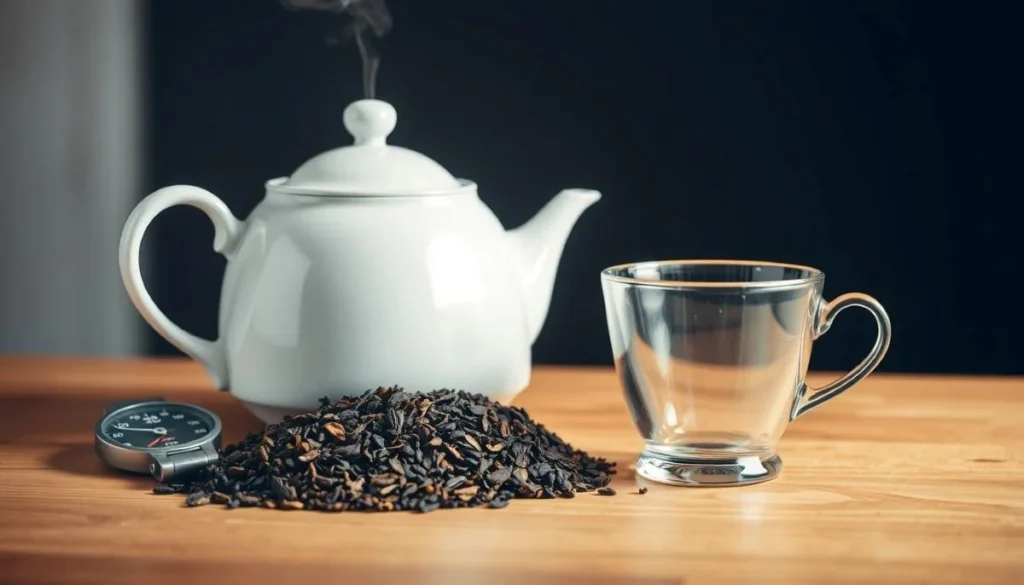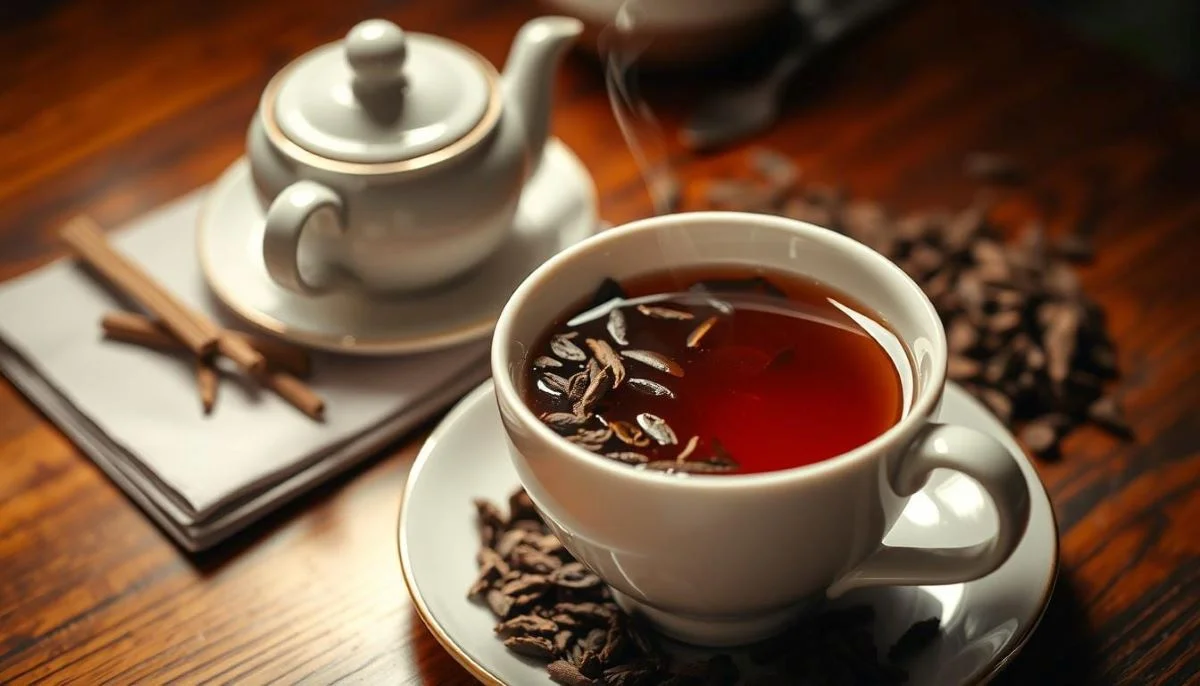English Breakfast Tea Caffeine Content Guide
Every morning, I reach for my English breakfast tea, wondering about its caffeine. Does it have caffeine? The answer might surprise you. This tea is more than just warm; it’s a special drink with just the right amount of caffeine to start your day.
Black tea, the base of English breakfast tea, has a moderate caffeine level. An 8-ounce cup has about 42 mg of caffeine. This is less than coffee’s 96 mg per serving. So, English breakfast tea is a good choice for a gentle energy boost.
Knowing how much caffeine is in your tea helps you choose better drinks. English breakfast tea gives you a gentle wake-up, blending tradition with just the right caffeine. It helps you start your day smoothly, without sudden highs or lows.
This tea is made from black teas grown in the Camellia sinensis plant. It’s not just a drink; it’s a cultural experience. The caffeine in English breakfast tea is carefully balanced to help you start your day with energy and focus.
Understanding English Breakfast Tea Basics
English Breakfast tea is loved by many around the world. It has a strong flavor and just the right amount of caffeine. This makes it a favorite for starting the day.
Starting your journey with English Breakfast tea means learning about its mix and its place in culture. It has about 40 to 70 milligrams of caffeine per 8-ounce cup. This is enough to give you a gentle energy boost.
Origins and Traditional Blends
The English Breakfast tea blend is a mix of black teas from all over. These teas come from:
- China
- Sri Lanka
- India
- Africa
Components of English Breakfast Tea
To understand the caffeine in English Breakfast tea, we need to look at its parts. The blend includes:
- Assam tea: It gives a strong, malty taste
- Ceylon tea: Adds a bright and crisp note
- Kenyan tea: Brings depth and strength
Historical Significance in Tea Culture
The Industrial Revolution made tea more common. English Breakfast tea became popular during this time. It symbolizes British culinary tradition.
Tea is more than a drink – it’s a cultural experience that connects people across generations.
Looking for a morning pick-me-up or a cozy ritual? English Breakfast tea is a great choice. It’s a journey of flavors and heritage.
Does English Breakfast Tea Have Caffeine?
Many people wonder about the caffeine in English Breakfast tea. This tea does have caffeine, with about 40 to 70 milligrams in an 8-ounce cup. The amount of caffeine can change based on a few important factors.
Learning about the caffeine in English Breakfast tea is interesting. Here are some key points:
- Brewing time affects how much caffeine is extracted
- The quality of the tea leaves also matters
- Water temperature is crucial
Different brands have slightly different caffeine levels. For example:
- Twinings usually has 40-50 mg per cup
- Yorkshire Tea has more, around 60-70 mg
- PG Tips often has the most caffeine
How you react to caffeine is important. The safe daily amount is about 400 mg. This means you can safely drink 5-10 cups of English Breakfast tea without going over the limit.
Tip: If you’re sensitive to caffeine, try brewing your tea for a shorter time. Steeping for just one minute will make the tea less caffeinated and milder in taste.
“Know your tea, know yourself” – Tea enthusiast wisdom
Comparing Caffeine Levels with Other Beverages
Knowing how much caffeine is in different drinks helps you choose wisely. English breakfast tea gives a moderate caffeine boost. Let’s see how it compares to other caffeinated drinks.
Coffee vs English Breakfast Tea: A Caffeine Comparison
Yes, black tea like English breakfast does have caffeine. An 8-ounce cup of English breakfast tea has about 47 mg of caffeine. In contrast, a standard drip coffee has around 96 mg. So, your favorite black tea gives a softer energy boost than coffee.
| Beverage | Caffeine Content (8 oz) |
|---|---|
| English Breakfast Tea | 47 mg |
| Drip Coffee | 96 mg |
| Espresso (1 oz) | 63 mg |
| Green Tea | 29 mg |
Different Tea Types and Caffeine Levels
English breakfast tea and caffeine levels differ among tea types. Green tea has less caffeine, about 29 mg per cup. Pu-erh tea can have up to 100 mg per serving.
Energy Drinks and Other Caffeinated Beverages
English breakfast tea has less caffeine than energy drinks, which have about 79 mg per 8 ounces. Energy shots can have up to 200 mg in just 2 ounces. Tea is a gentler choice.

The maximum safe caffeine intake for most adults is 400 mg per day. Your drink choice can help you stay within these limits while enjoying a nice drink.
Brewing Methods Impact on Caffeine Content
Learning how brewing methods change the caffeine in English Breakfast tea can help you make your ideal cup. The way you brew your English Breakfast black tea can greatly affect your experience.
Different brewing methods greatly affect how much caffeine is pulled from the tea leaves. Here are key factors that impact caffeine content:
- Steeping Time: Longer brewing increases caffeine release
- 30 seconds: Minimal caffeine extraction
- 3-5 minutes: Optimal caffeine release
- Over 7 minutes: Potential bitter taste and maximum caffeine
- Water Temperature: Hot water accelerates caffeine extraction
- Near boiling (195-205°F): Most effective for caffeine release
- Cooler temperatures: Slower caffeine extraction
- Tea Leaf Quality: Whole leaves vs. crushed leaves impact caffeine levels
Typical English Breakfast tea has 30-60 milligrams of caffeine per cup. By tweaking your brewing method, you can adjust the caffeine in your tea.
Pro tips for managing caffeine content:
- Use fresh, high-quality tea leaves
- Measure steeping time precisely
- Experiment with water temperature
- Consider your personal caffeine sensitivity
Keep in mind that your personal brewing preferences and the tea’s origin can slightly change the caffeine content. Your perfect cup is just a few tweaks away!
Health Benefits Beyond Caffeine
Many people focus on the caffeine in English breakfast tea. But, it has many more health benefits. These advantages make it more than just a morning pick-me-up.
Powerful Antioxidant Properties
English breakfast tea is full of antioxidants. These protect your body from damage. They fight off harmful free radicals, which can lower your risk of chronic diseases.
- Helps prevent cell damage
- Supports overall cellular health
- Potentially reduces risk of certain cancers
Heart Health Benefits
Drinking English breakfast tea regularly can be good for your heart. Studies show it can lower bad cholesterol and help with blood pressure. The caffeine gives you energy, but the tea’s long-term benefits for your heart are even more important.
Digestive System Support
English breakfast tea is good for your digestive system. It has compounds that can soothe your digestive tract and help your gut function. Moderate consumption may reduce inflammation and support your digestive health.
- Supports digestive tract health
- May reduce digestive inflammation
- Promotes overall gut wellness
Discover the holistic benefits of English breakfast tea beyond its caffeine content and transform your daily wellness routine.
Optimal Brewing Techniques for Maximum Benefits

Learning how to brew English Breakfast tea is key to getting the right mix of flavor and caffeine. The way you brew it affects the caffeine level in the tea. So, brewing technique is very important for tea lovers.
To get the best cup, follow these important brewing tips:
- Water Temperature: Heat the water to about 95°C (203°F) for the best caffeine and flavor extraction
- Steeping Time: Steep for 3-5 minutes to get the most caffeine and taste from the tea
- Tea Leaf Quantity: Use 1 teaspoon of loose tea leaves for every 8 ounces of water
The amount of caffeine in English Breakfast tea can change based on how you brew it. Steeping for 3 minutes gives a lighter flavor with a bit less caffeine. But steeping for 5 minutes makes the tea stronger and more caffeinated.
Pro tip: Use fresh, filtered water and high-quality tea leaves for the best caffeine and flavor extraction.
Try different brewing methods to find your ideal cup. Remember, water quality, tea leaf freshness, and timing are all important for a great cup of English Breakfast tea. They help meet your caffeine and taste needs.
Understanding Caffeine Sensitivity and Effects
English breakfast tea has different amounts of caffeine. Knowing how it affects you is important for enjoying it safely. Everyone reacts to caffeine in their own way, so it’s crucial to know how you react.
Physical Responses to Caffeine
How you react to caffeine in English breakfast tea depends on many things. Some people feel more alert right away, while others might get jittery or anxious. On average, a cup of English breakfast tea has 40-70 milligrams of caffeine.
- Common physical responses include:
- Increased mental focus
- Temporary energy boost
- Potential mild anxiety
- Slight elevation in heart rate
Best Times for Consumption
When to drink English breakfast tea with caffeine is important. Most doctors say to drink it before 2 PM to avoid sleep problems.
| Time of Day | Recommended Consumption |
|---|---|
| Morning | Ideal time for 1-2 cups |
| Afternoon | Limited intake recommended |
| Evening | Avoid caffeine |
Individual Tolerance Levels
How sensitive you are to caffeine can vary a lot. The safe daily limit is 400 milligrams, which is about 6-8 cups of English breakfast tea. Listen to your body and adjust how much you drink based on how you feel.
Remember, personal caffeine tolerance is unique. What works for one person might not work for another.
Quality Factors Affecting Caffeine Content
When we look at English Breakfast tea, several factors affect its caffeine content. Knowing these can help you pick the right tea for you.
The place where tea leaves are grown greatly influences their caffeine levels. Assam tea, for example, has a strong flavor and more caffeine.
- Leaf Type: Younger tea leaves have more caffeine
- Processing Method: How tea is processed changes caffeine levels
- Harvesting Time: Tea from the first harvest has more caffeine
- Storage Conditions: Keeping tea properly helps keep caffeine levels up
English Breakfast tea’s caffeine content varies by brand. Loose leaf teas usually have more caffeine than tea bags. How you brew your tea also matters. The water’s temperature and how long you steep it affect the caffeine.
Interestingly, the age and processing of tea leaves can change caffeine levels. Older leaves might have less caffeine, but some teas get better with age.
Pro tip: For maximum caffeine extraction, use hot water and steep your English Breakfast tea for 3-5 minutes.
Knowing these factors lets you pick an English Breakfast tea that fits your caffeine needs and taste preferences.
Reach more breakfast tea ideas by visiting links bellow:
- Start Your Day Right with English Breakfast Tea
- Discover Premium English Breakfast Loose Leaf Tea Today
- Is English Breakfast Tea Black Tea? Explore the Facts
- Discover the Delights of English Breakfast Tea
Conclusion
Knowing how much caffeine is in English breakfast black tea helps you choose better drinks. It has about 47mg of caffeine per 8oz cup. This amount gives you a nice energy boost without feeling too jittery.
The mix of caffeine and L-Theanine in this tea helps you stay focused and alert. It’s different from coffee, which can make you feel shaky.
How you brew your tea affects the caffeine it has. Things like how long you steep it, the water’s temperature, and the tea’s quality matter. By trying different ways, you can get the perfect amount of caffeine for you.
English breakfast tea is not just about caffeine. It’s also good for your heart and brain. Drinking it every day might help lower your risk of heart disease and strokes. It’s full of antioxidants and can even make you smarter.
Trying English breakfast black tea is a great adventure. Everyone reacts differently to it. Pay attention to how your body feels and enjoy it as part of a healthy life. Whether it’s Twinings, Yorkshire, or Taylors of Harrogate, each cup can make your day better.

